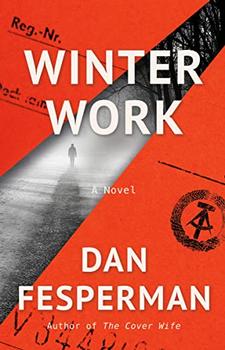Summary | Excerpt | Reviews | Beyond the Book | Read-Alikes | Genres & Themes | Author Bio

A novel
by Dan FespermanThis article relates to Winter Work
 The main character in Dan Fesperman's spy thriller Winter Work is a colonel in East Germany's HVA, a unit of the infamous East German security service commonly referred to as the Stasi.
The main character in Dan Fesperman's spy thriller Winter Work is a colonel in East Germany's HVA, a unit of the infamous East German security service commonly referred to as the Stasi.
After World War II, the United States and the USSR vied for influence over Europe, with most countries in the western half of the continent joining NATO, while eastern countries aligned with the USSR. Germany was split into two countries, with the western half becoming the democratic Federal Republic of Germany (FDR or West Germany) and the eastern section the socialist German Democratic Republic (GDR or East Germany).
In early 1950, East Germany formed the Ministerium für Staatssicherheit ("Ministry for State Security"), also known as the Stasi. The organization was modeled after the USSR's security agency, the KGB, and was responsible for gathering intelligence on its perceived international rivals as well as its own people. According to History Hit, its domestic role involved "spying (gathering intelligence) on the population with the aim of keeping the government informed and being able to quash any discontent before it became a threat." Before being disbanded in 1990, the Stasi had arrested more than 250,000 East German citizens for being "subversives" — a classification given to basically anyone who offered even minor criticism of the government. At its height, the Stasi employed more than 90,000 people and had over 170,000 informants. Their network was so extensive that they had detailed files on one in three citizens.
The largest division within the Stasi was the Hauptverwaltung Aufklärung ("Main Department Reconnaissance"), aka the HVA, which spied on NATO countries, in particular the United States and West Germany. It sought information about military, political systems and technological advances, and it also tried to manipulate these institutions by embedding agents within their power structures. HVA agents often obtained lowly positions as gardeners or secretaries in government offices, but in one of the most egregious instances, the personal assistant to the West German chancellor was revealed to be an HVA agent in 1974. The HVA was widely viewed as the best foreign intelligence service of its day – regarded by many as even more effective than the KGB.
One of the things that made the HVA so successful was that the information mostly flowed in one direction; only one agent was known to have defected to the West during the post-war period, and the organization isn't known to have been infiltrated by anyone on the other side. The extent to which the West German government had been penetrated wasn't suspected until after the Stasi was disbanded and Western powers obtained its secret files. Adding to the mystique surrounding the agency was the man who ran it for 34 years: Markus Wolf (1923-2006). HVA security was so tight that although the CIA eventually learned his name, they couldn't obtain a physical description of him for decades, and he became known as the "man without a face."
When the East German government collapsed, some Stasi and HVA agents fled to the USSR, while others cut deals with West Germany and the United States for their cooperation. Most, however, simply stayed put. The spy network had been so extensive in East Germany that it was deemed impractical to prosecute former Stasi agents and informants, and even those at the top of the hierarchy received little to no punishment. For example, Stasi chief Erich Mielke served only two years in prison.
Flag of East Germany, courtesy of Wikimedia Commons
Filed under People, Eras & Events
![]() This "beyond the book article" relates to Winter Work. It originally ran in August 2022 and has been updated for the
December 2023 paperback edition.
Go to magazine.
This "beyond the book article" relates to Winter Work. It originally ran in August 2022 and has been updated for the
December 2023 paperback edition.
Go to magazine.
Your guide toexceptional books
BookBrowse seeks out and recommends the best in contemporary fiction and nonfiction—books that not only engage and entertain but also deepen our understanding of ourselves and the world around us.